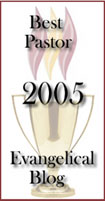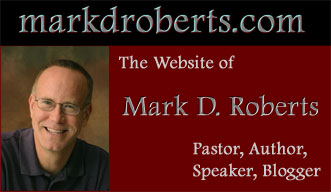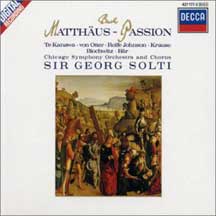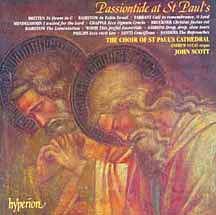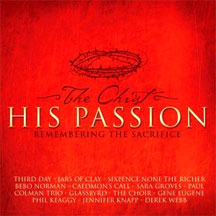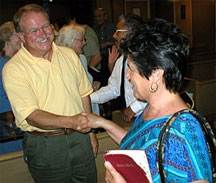| |
A Resource by Mark D. Roberts |
|
Archive for March, 2005
Note: This archive contains all of my posts for this month that are not included in some other series. I really don't have the time to save things in more than one place. If you're looking for a specific item, use the "Search" button in the upper left hand corner. Thanks. |
by Rev. Dr. Mark D. Roberts
Copyright © 2005 by Mark D. Roberts
Note: You may download this resource at no cost, for personal use or for use in a Christian ministry, as long as you are not publishing it for sale. All I ask is that you give credit where credit is due. For all other uses, please contact me at mark@markdroberts.com. Thank you.
Music for Lent and Holy Week
Posted at 9:45 p.m. on Friday, March 4, 2005
Music is one of the things that make the season of Christmas so special. Can you even imagine Christmas without our beloved carols? I doubt it. One of the reasons we don’t "get into" the others seasons of the Christian year, it seems to me, is that we tend to be much less aware of thematically appropriate music.
A few years ago I decided to remedy this problem by developing a small collection of music for other seasons of the church year, notably Lent, Holy Week, and Easter. Some of the pieces from my collection I've been listening to now for almost twenty years. Others recordings are new. Both the themes of the music and my own listening traditions have helped me appreciate more deeply the meaning of the Christian seasons.
Last year I began to share with my blog readers some of my music for Lent and Holy Week. Yet I did this in Holy Week itself, which left very little time for folks to purchase the recordings. This year I'm starting earlier. My hope is that you might be inspired to purchase some of the music I recommend for yourself, so that your experience of God in this season might be deeper. (In case you're wondering, I don't get a red cent for any of my recommendations. Yes, I'm giving away free advertising, but I consider this a service to my blog readers, and I'm perfectly happy to support good music also.)
Today I want to highlight three different recordings that might enrich your experience of this season. One is my all time favorite; one I've enjoyed for several years; and one is new this year.
My All-Time Lenten/Holy Week Favorite: St. Matthew Passion by Johann Sebastian Bach
For twenty years I've made it a habit to listen to Bach's St. Matthew Passion during Holy Week, often on Good Friday. This is an astounding composition, great in scope and also in performance. It includes two choirs and almost three hours of music. (I once saw a live performance at the Music Center in Los Angeles.) Bach took Matthew's text of Jesus's passion (in German) and set it to music, adding choral pieces that include theological and emotional responses to the narrative. If you can set aside three hours during Lent or Holy Week, I’d urge you to take the libretto (lyric booklet, with translation) of Bach’s masterpiece and allow the St. Matthew Passion to bring you to the foot of the cross.
Here is a tiny music clip from one of the early chorales of the composition. The words are: "Herzliebster Jesu, was hast du verbrochen, Dass man ein solch hart Urteil hat gesprochen?" In translation, "O blessed Jesu, how have you offended, that now on You such judgment has descended?" To hear the clip, click here (256 K).
My recording of St. Matthew Passion, with the Chicago Symphony directed by Sir Georg Solti (including Kiri Te Kanawa as the soprano soloist) is no longer available new. You can by other recordings, but I can't make a recommendation. |
|
A Classical Collection: Passiontide at St. Paul's
This collection features the heavenly choir of St. Paul’s Cathedral in London singing four Lenten songs, five songs that focus on the actual passion of Christ, and four celebrative Easter anthems. I’ve owned this CD for several years and have enjoyed it thoroughly, though I almost never listen to the whole album at once. Prior to Easter I focus on the first nine tracks. Thereafter I enjoy the other four, including “This joyful Eastertide” by Charles Wood, one of my favorite Easter pieces. You can purchase this recording online.
All the selections of the album are classical choral music representing a wide range of centuries and styles. The clip I've included is from a sixteenth-century song by Richard Farrant, "Call to remembrance, O Lord." These are the words you'll hear if you click here (196 K). |
|
A New Contemporary Collection: The Christ – His Passion – Remembering the Sacrifice
This 2004 recording features several popular contemporary Christian artists, including Third Day, Jars of Clay, Sara Groves, and Bebo Norman. The thirteen songs on this album focus on the death of Christ and its meaning. Although popular in genre, they vary considerably in tone and style. In many cases both the lyrics and the music are quite compelling. You can listen to excerpts from this album and purchase it at the Amazon.com website.
The following clip is from a song entitled "Kyrie Eleison" (Greek for "Lord, Have Mercy"). It is sung by Leigh Nash, singer for the popular Christian group, Sixpence None the Richer. Click here to hear this clip (232 K). |
|
A couple of closing comments:
1) If you live near a Christian bookstore, chances are that they will have a selection of music for the season of Lent/Holy Week. Usually they have equipment so you can listen to the recordings before you purchase them. I'd encourage you to visit your local bookstore and see what it has in stock.
2) If you have favorite recordings that are appropriate for Lent and Holy Week, please use the guestbook to share these suggestions with others.
Fear or Risk?
Posted at 11:15 p.m. on Saturday, March 5, 2005
Introduction to a sermon entitled "Fear or Risk."
When I was a boy, one of the most magical places in the world was my grandfather's workshop. A long, narrow room on the back of his garage, the "shop" was filled beyond capacity with tools of every kind. When I was young, I spent literally hundreds of hours sitting on the stool in "Poppy's" shop, watching him create masterpieces out of wood and metal. Along the way he'd explain to me what he was doing, how the tools worked, and the properties of various construction materials. Plus he'd tell me endless stories about his work as a construction superintendent, or his days growing up on a ranch in Monrovia, or his time as an engineering student at Harvard.
| As I grew, my grandfather let me use some of his tools. First it was just the hand tools: hammers, handsaws, screwdrivers, and the like. When I was about ten years old he introduced me to the power drill. I loved the feeling of grown-up power as I drilled hundreds of holes in scrap lumber. But the rest of the power tools were still off limits, most of all the table saw. Of course Poppy shared stories of men he had known who had lost fingers because of their lack of respect for a table saw blade, so I felt no urgency to use his. But I did dream of the time when I'd be free to use all the tools in the shop. |
|
| |
Not a picture of my grandfather and me, but this is what we looked like. |
That day came when I was in ninth grade. My family had recently gotten a new dog and I was going to make a doghouse for her. I drew up careful plans, went to the lumberyard to buy the materials, and had a friend with a car deliver them to Poppy's driveway. I explained to him what I wanted to do, fully expecting that he would supervise the project and do all of the cutting with the table saw. But to my surprise he said to me, "Do you think you could handle this job yourself?" "Yes," I answered. "Even the table saw?" "Yes," I gulped, "I think so." "Okay," he said, "I think you're ready. The shop is yours. You can use any tool you need."
 |
I was floored, and grateful, and, frankly, a little scared. But that was one of the watershed moments of my life. It was a sort of Protestant bar mitzvah, a rite of passage in which my grandfather conferred manhood upon me. I didn't read the Torah in Hebrew, but I got to use every tool in Poppy's shop, even the finger-eating table saw (which, by the way, I have in my garage and use regularly for home improvement projects).
I did indeed make a doghouse that day long ago. I think it still exists at my mother's house, thirty four years later, so I guess I did a decent job. And Poppy didn't hover over me or anything like that. And I didn't cut off any fingers. Above all I felt proud, and grown up, and trusted, very trusted. Poppy actually trusted me with his beloved shop. |
The real McCoy, still does a great job cutting wood (and not fingers, thank God).
|
|
Trusting with Talents
In Jesus's parable from Matthew 25 there's a similar act of trust. A man entrusts to his slaves several talents, either five, two, or one. It's a little hard to compute in today's terms what these talents were worth, but it's likely that one talent was equal to about $400,000 in today's money (a day laborer working 20 years). So the slave who received even one talent was entrusted with a significant amount.
Have you thought about the risk the man is taking by entrusting is fortune to his three slaves? If they do well with his talents, then he'll be even richer than before. But if they mess up, which is a real possibility of course, then the wealthy man will be ruined.
Stewardship Strategies
The slaves didn't own the talents, of course. Rather, they were managers of the owner's property. Or to use a slightly older word, they were stewards of what belonged to their master.
So what were their stewardship strategies? (For an answer to this question and for the rest of this sermon, click here.)
"Fellowship Time" in Church – A Hot Button Item!
Posted at 10:30 p.m. on Friday, March 11, 2005
Well, Josh Claybourn of In the Agora certainly pushed people's buttons recently! A week ago he blogged on one of his pet peeves – pastors who ask people to greet those sitting around them in a worship service. Such a "fellowship time," Josh argues, accomplishes very little, other than to make some folks feel uncomfortable. Josh's post was noted by Tod Bolsinger at It Takes a Church and Jared at Thinklings. These posts, along with Josh's, elicited a slew of comments, mostly agreeing that the artificial greeting time in a worship service has to go.
I want to weigh in on this issue, partly because at a gut level I sympathize with Josh. I'm not extroverted by nature, and I remember vividly how awkward I felt during the greeting time in the church where I grew up. Every week the pastor would ask us to turn and greet those around us, usually with a bit of biblical truth he wanted to emphasize that morning. So I would turn to my neighbor and say something like, "God has great plans for your life!" But I what I really felt like saying was, "I hate this so much I wish I could die!" The worst moments of all came during my teenage years when I happened to be sitting next to my dad in church. He and I didn't talk too much those days, and we'd never in a million years have said things to each other like "God has great plans for your life!" We had enough trouble choking out, "So what do you think about those Dodgers?" I can't even begin to convey how ill-at-ease I felt in those tense moments of pseudo-intimacy with my dad. They still give me the willies! Ugh!
When I was in my twenties, my friends and I found a way to escape from the uncomfortable tedium of the greeting time in our worship services. When the pastor told us to say, "Christ is always there for you!" we'd turn to each other and utter something inane like, "I love mayonnaise!" With a chuckle or two we'd survive the awkwardness until we could get back to real worship.
| When I came to Irvine Presbyterian Church fourteen years ago, I inherited the tradition of "Passing the Peace of Christ." At some point in the service a leader would say to the congregation, "The peace of Christ be with you." They'd respond, "And also with you." Then everybody would be encouraged to share that same greeting with each other. I quickly worked to expunge that "empty tradition" from our worship order, arguing that it made people uncomfortable and that it was especially grueling for visitors. So, that was that, or so I thought. No more greetings! |
|
| |
A couple of happy worshippers pass the peace of Christ. |
But during the next few weeks I started hearing from church members how much they missed passing the peace. People weren't mean or demanding, just sad that a beloved tradition had been banished from the kingdom. They shared stories of how much it had meant to them in the past when they were going difficult times and, for a few moments in a worship service, people shared the peace of Christ with them. For them, this "empty tradition" wasn't empty at all. It was full of deep meaning. It was a channel through which they received and shared God's grace. This was all new to me. I had never heard of such a thing. Nor had I ever imagined that such a rudimentary and repetitious action could make such a difference in people's lives. Frankly, I was stunned by what I learned.
After hearing from so many people, I finally decided to give the passing of the peace another go. This time, however, I tried to help myself and the others in the congregation who didn't get it. I hoped we could invest this gesture with genuine meaning. So I spent a good chunk of time one Sunday explaining the rationale behind the passing of the peace. I talked about how it was a kind of a blessing or prayer. Though speaking to a person, we we're really asking God to bless that person with the peace that passes understanding. I shared a couple of the stories I had heard about how much this gesture had meant to some of our members. I urged folks, not just to rattle off the words, "The peace of Christ be with you," but to say it with meaning. Then we took a little longer than before to pass the peace.
I must say I was astounded by what happened. It was as if the grace of God flooded that room. Even I, for the first time in my life, actually passed the peace of Christ to people. I did more than mouth the words. I sensed that I was a vehicle for the gift of God's peace. The whole experience was amazing and transformational. For the first time I tasted the richness of a longstanding Christian tradition that I had formerly written off as stale.
I resolved from that time onward to make the passing of the peace a regular feature of our worship. I also resolved to explain its meaning and power on a fairly regular basis, so newcomers would understand what we were doing. I realized that we ran the risk of making some people feel uncomfortable, but I felt that the benefits outweighed that risk. I've never second-guessed that decision. And I don't think I've ever received one negative comment about the passing of the peace from worshipers, either members or guests. I'm sure some folks feel a bit uncomfortable at times, but my sense is that most people find value in our tradition of passing the peace.
In my next post I want to talk a bit further about why this tradition works for us. I also want to reflect on the theological rationale for such a practice. In the meanwhile, may the peace of Christ be with you!
The Peace of Christ Be With You!
Posted at 9:20 p.m. on Saturday, March 12, 2005
Yesterday I threw my hat into the ring of the "greetings in a worship service" discussion. While feeling the pain of those who dislike a "time of fellowship" when worshipers have to turn and greet those sitting around them, I shared my own experience of coming to value the tradition of passing the peace of Christ.
I expect some of my readers are thinking: "Okay, that's fine for you and your church because you're more traditional. But we're not, and things like the passing of the peace just wouldn't work in our setting." Perhaps this is a valid criticism. Perhaps not.
Recently we started up our fourth worship service each weekend (see picture below). Now we have one on Saturday night (band-led) and three on Sunday morning (2 are choir-led/blended, plus the new service). The new service, called Veritas, is a "post-contemporary, post-post modern" service intended primarily for folks under 35. The band that leads is loud, with lots of drum and electric guitar. The dress code is casual. Jeans are more common than khakis or skirts. Most of the songs we sing were written within the last ten years (though every week we do at least one classic hymn). You might think this service would be the last place where people would want to pass the peace. But if you thought this, you'd be wrong.
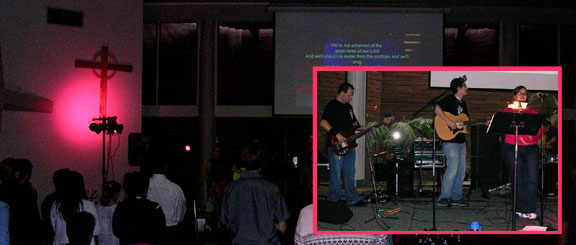
As I was preparing for our inaugural service, I wondered what sort of benediction would be appropriate. For some reason it occurred to me that it might be good to end with passing the peace of Christ. This seemed a bit odd to me, but I figured I had little to lose. So, at the close of our first service I explained the purpose of the benediction and how that was usually a blessing from the pastor to the people. Then I showed how the passing of the peace of Christ could be a benediction, a chance for people to bless others in God's presence. I shared about how much we all need to experience the peace of Christ in our lives. Then I encouraged those who had gathered to end the service by passing the peace of Christ to each other. The response was energetic and heartening. The comments I received from participants were uniformly positive. They loved the chance to participate in the benediction rather than just receiving it. And they felt the power of passing the peace of Christ with intentionality.
Why, I wonder, has our experience of greeting one another with the peace of Christ been so positive, even in a setting like Veritas? I have several ideas I'll throw out here:
1. Passing the peace of Christ doesn't sound silly. Although we might not ordinarily speak in these terms (I wonder why not?), saying "The peace of Christ be with you" isn't like saying, "I love you in the love of the Lord." It isn't hokey or sappy.
2. Passing the peace of Christ connects us to the larger and older traditions of Christian worship. Although we worship innovators often talk as if we have to come up with something new all the time, in fact people are yearning for some connection with the past and with the larger body of believers. We want to feel as if we are part of something much bigger and older than we are.
3. Passing the peace of Christ has become meaningful to people in part because that meaning was explained to them. In my last post I told the story of how I learned to value this practice by listening to the stories of my church members. I also described how I have explained the purpose of passing the peace to my congregation.
4. Passing the peace of Christ is a positive experience for us because we mean what we say. When I took this as simply a churchy way to say "Hello," I didn't especially like it. But when I realized that my words could actually be a channel of blessing, that folks could actually experience the peace of Christ as I offered it to them, this completely changed my estimation of passing the peace.
5. Passing the peace of Christ is an action which, if done with intentionality, reflects one of the fundamental purposes of the Christian gathering. The rather popular idea that church is really about a "God and me" experience doesn't come from the Bible, but from enculturated American Christianity. This was one of my central points in my book After "I Believe." And it has been worked out with theological sophistication by my friend Tod Bolsinger in his excellent book, It Takes a Church to Raise a Christian.
6. Passing the peace of Christ means so much to us because we need the peace of Christ. No matter what our station in life, no matter what we're dealing with, we all need to know more of Christ's peace. Thus what we're hearing from people around us is not "Hi? How are you?" but, and I paraphrase, "Here's a gift you need. Here's something for which your souls longs. Here is the peace of Christ!"
In the last thirteen years I estimate I've passed the peace of Christ over 7,000 times. Of course most of these instances have become a blur in my memory, but a few stand out.
I remember a time when I had the chance to pass the peace of Christ to an elderly church member who had been sick for months and hadn't been to church. Even before I told him how glad I was to see him, I offered him the peace of Christ.
I remember sharing the peace of Christ with one of my elders a few days after we had a big argument in a board meeting. As we shared the peace of Christ together, God healed the rift between us.
I remember so many times turning to my children, giving them a hug and offering the peace of Christ. "The peace of Christ be with you too, Daddy!" Could any words mean more to a father than these?
Sure, such things as passing the peace can become rote and empty. Sure, they can be done in a way that isn't welcoming. But, as for me and my house and my church, we will pass the peace. In conclusion, the peace of Christ be with you!
Home
|
